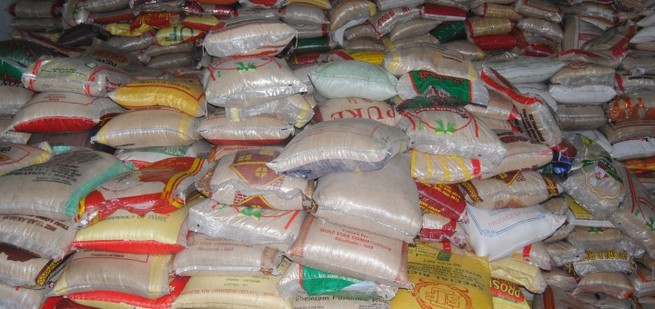
The closure of Nigeria’s land borders may be impelling local rice producers to raise their capacities in response to concerns about the consequent shortage, which has induced price hike.
Rice is the most popular food staple in Nigeria with local demand in excess of seven million tonnes. But until the border closure policy was enforced in August, widespread and largely unchecked smuggling through the country’s western boundary with Benin Republic accounted for much of the rice consumed in the country.
This helped to cover the deficit due to the lower local production compared to demand. Businesses in Benin, a nation of 11 million people, about five per cent of Nigeria’s population, would import rice from Thailand, for instance, and re-export to their much bigger neighbour Nigeria.
So, with the border closure, the consequence has been a shortage, traders told PREMIUM TIMES.
“The closure has taken full effect and nobody is bringing rice from Cotonou (Benin Republic),” one trader, Lateef Ayantunji from Oyo, said by phone. “There is scarcity because the local rice is not enough and we don’t even get to buy it easily.”
Another person, Lawrence, interviewed at Rumuola, Port Harcourt local market, said something similar to Mr Ayantunji.
“Many people who had the foreign rice before the border closure are hoarding the product and the local rice is not very available,” he said.
“The scarcity is temporary”
The General Manager (GM) of Labana Rice, Abdullahi Zuru, acknowledged the scarcity in an interview with PREMIUM TIMES. “This may be so now because the processors are just working to raise the capacity to satisfy the local demand, different from the previous time that they were in slumber,” he said. “The scarcity is just temporary.”
Mr Zuru said his Kebbi-based company is already on course to attaining 80 per cent capacity utilisation following the border closure and the fresh need to meet the local demand.
“By the first quarter of next year, we’ll have added 20 tonnes to our current 16 tonnes processing per day,” said Mr Zuru, who predictably supported the government’s border sealing move, which, as he suggested, is a necessary trade policy to help the local content. “There was no market for the Nigerian rice and millers were only buying from farmers with little value.”
A bag of (the local) rice is now between N17 thousand and N20 thousand across the country, from about N13 thousand pre-border policy. But Mr Zuru regretted the hike, which he blamed on distributors.
The millers are selling at a reasonable price of N14 thousand which we all agreed to,” he said. “The distributors are raising the price to gain more than the millers.”
Mr Ayantunji, from Oyo, though, noted a crisis relating to scarcity in the market, he said more availability going forward would bring the price down.
“The local rice should just be more available to be easily bought and then the price will come down,” he said.
The government is yet to unveil any fresh policy as a measure to ensure local production satisfies demand. The Anchor Borrowers’ Programme, set to help attain self-reliance in food production, is now dogged by fraud allegations, unremitted loans, and other irregularities, creating a setback for an ambitious programme considered as a fast-paced revolutionary march towards self-reliance in rice production.
However, Mr Zuru said investments in the rice production would continue and facilities would be expanded if the government sustains the border sealing policy.
“By 2022, Nigeria will graduate to being an exporter of rice,” he said. Asked to comment on consumer’s complaints about the quality of local rice, he said, “they are only used to the polished foreign rice but they don’t know the nutritional value of the local rice, which is better.”
“The local rice is not bad,” Mr Lawrence said in Port Harcourt.
No end in sight
There are other products, including fabrics, chicken and even vehicles, involved in trade flow from Benin.
The sealing of border crossings with Benin and Niger, the government says, was in response to the widespread smuggling and would be in place until the neighbours help curb the problem in line with Economic Community of West African States (ECOWAS) protocols.
“The idea is to ensure that the protocol that is involved in transit of goods and trade facilitation is adhered to so that we will all live and complement each other,” Customs boss, Hameed Ali, said in September.
Mr Ali said Nigeria has been realising rising revenue since the closure of the borders, with a record N115 billion in September. This, he explained on Thursday, is because those who used to smuggle things into the country now go to the ports and pay the necessary duties.
Nigeria’s move came less than two months after the country joined nearly all other African countries to sign the African Continental Free Trade Area (AfCFTA) agreement.
There are also international reports suggesting severe costs for Benin Republic, following Nigeria’s trade move.
France 24 reported that business people in Benin are panicking and that “unfounded rumours” are spreading in the local dailies that Nigeria would go to the extent of cutting off electricity supplies to the country.
Benin is a part of West African Power Pool and it is an international customer in Nigeria’s electricity market. However, Nigerians still experience common blackouts and less than half of the population is connected to grid electricity.
“Buhari and his country want to put an end to us,” France 24 quoted a Beninese Barthelemy Agon, a pineapple trader, “who like many others have been hard-hit by fruits and vegetables no longer being exported to their big neighbour.”
But “a country has to protect its economic interest,” commented Bismark Rewane, a member of the presidential economic advisory council.
However, in a reverse direction, rice produced locally, mostly with government’s aid in the country’s north, is also smuggled to the neighbouring Niger Republic from Nigeria’s northern borders, thereby inhibiting the self-sufficiency ambition of the government. That is similar to how petroleum products are smuggled to Benin Republic from the western borders.
(Premium Times)







Leave a comment